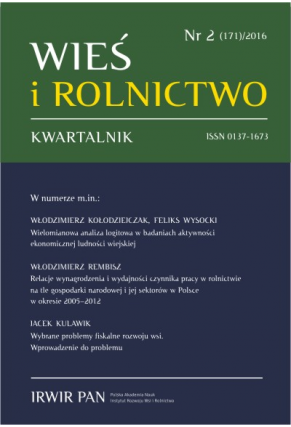Farmers Relations with Input Suppliers – Some Evidence from the Dairy Sector in Poland
DOI:
https://doi.org/10.53098/wir022016/07Keywords:
food chain, dairy farmers, feed suppliers, vertical integration, backward vertical spilloversAbstract
The paper aims at improving our knowledge about farmers’ relations with input suppliers and analyses the backward vertical spillovers between the “boundary” chains. It uses a micro-data on dairy sector in Poland to elicit farmers’ opinions on their cooperation with feed suppliers and confront them with farmers’ actual behaviors. We find that dairy farmers have on average a long and stable cooperation with feed suppliers. A great majority of the respondents perceive their relationship with feed supplier as either good or very good. The relation between farmer and feed supplier is usually not formal (over 90% of farmers do not have any written contract). Price level and the quality of feed is the most important feature of the relation mentioned by farmers. However, we observe significant differences in the farm characteristics, obtained discounts, possibilities of the price negotiations, etc. depending on the channel of the feed supply. Despite no significant difference in farmland size, farmers who purchase feed directly from feed producer have a significantly larger milk production and receive significantly higher discount from the feed supplier than farmers purchasing feed from an intermediary. This group of farmers is also more active in price negotiations and more often considers changing their supplier.References
Briones, R.M. (2015): Small farmers in high-value chains: Binding or relaxing constraints to inclusive growth? World Development, 72, pp. 43–52
Dries L., Fałkowski J., Malak-Rawlikowska A., Milczarek-Andrzejewska D. (2011). Public policies and private initiatives in transition: evidence from the Polish dairy sector. Post-Communist Economies, 23 (2), 219–236.
Dries L., Gorton M., Urutyan V., White J. (2014). Supply chain relationships, supplier support programmes and stimulating investment: evidence from the Armenian dairy sector. Supply Chain Management, 19 (1), 98–107.
Jarzębowski S. (2013). Integracja łańcucha dostaw jako element kształtowania efektywności sektora przetwórstwa rolno-spożywczego. Treatises and Monographs, no 422, Wydawnictwo SGGW, Warszawa.
Kuijpers R., Swinnen J. (2016). Value Chains and Technology Transfer to Agriculture in Developing and Emerging Economies. Paper presented at the 2016 Allied Social Sciences Association (ASSA) Annual Meeting, San Francisco, CA, January 3−5, 2016, pp. 6.
Milczarek-Andrzejewska D. (2014). Zagadnienie siły w ekonomii – na przykładzie sektora rolno-spożywczego [Power in economics – the case of the agro-food sector in Poland]. Warszawa: Instytut Rozwoju Wsi i Rolnictwa PAN.
Piwowar A. (2013). Rynek pasz przemysłowych w Polsce w latach 2005−2011 [Feed industrial market in the years 2005−2011]. Journal of Agribusiness and Rural Development, 3 (29), 111−119.
Vorley B., Fearne A., Ray D. (ed.) (2007). Regoverning Markets. A Place for Small-Scale Producers in Modern Agrifood Chains. Aldershot: Gover Publishing.
Downloads
Article file downloads
Pages
How to Cite
Issue
Section
License
Copyright (c) 2016 Wieś i Rolnictwo

This work is licensed under a Creative Commons Attribution 4.0 International License.










